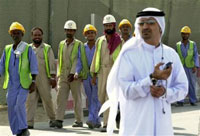Increased wages return workers to their jobs in Dubai
Workers' strike urged their employer to increase wages to compensate the dropping U.S. dollar, tens of thousands of south Asian workers returned to their jobs at building sites.

Dubai-based Arabtec Construction Giant Co. LLC said the strike by 40,000 of its workers that lasted more than a week could cause it to miss deadlines on several landmark projects.
The company "suffered financially ... in terms of completing projects," Arabtec executive director Tom Berry told The Associated Press late Monday. He said laborers began heading back to work on Sunday, but the AP could not independently confirm that most workers were back on the job until Tuesday.
Berry declined to say what projects may miss deadlines. Some of Arabtec's projects include a villa complex in the desert, high-rise beach-front buildings and a hotel on the site of world's largest building, the Burj Dubai, which is expected to be completed in 2008.
"An agreement was reached to increase their salary and they will go back to work," Berry said. He did not reveal the amount of the increase, but said it was a "fair increase to compensate them (the workers) for loses due to a weak dollar."
Before the strike, Arabtec paid its unskilled workers US$109 (Ђ74.77) a month while skilled ones received US$163 (Ђ111.80).
An official involved in negotiations between workers, Arabtec management and Emirates government officials said Tuesday that workers returned to work only after the company "offered an immediate raise of US$27 on basic (monthly) salary."
The official spoke on condition of anonymity because he was not authorized to speak to the press about the issue.
The end of the strike came as an Emirates human rights watchdog urged the government to set a minimum wage and lift its ban on trade unions, saying the pro-labor moves would avoid further turmoil.
"It's time to change the law that bans unions," Mariam al-Ahmadi, the deputy chairwoman of the Abu Dhabi-based Emirates' Human Rights Organization labor rights committee, said Tuesday.
"If unions are allowed, there will be no strikes, because the workers will talk about their problems and the government will try to solve them," she added.
Thousands of workers scattered across more than two dozen labor camps in the Emirates went on strike earlier this month, refusing to go to work until their salaries were raised by at least US$55 (Ђ37.73) a month.
Workers living in a labor camp at the edge of Dubai's busy port of Jabal Ali confirmed that the Arabtec strike had ended.
But one worker, who refused to give his name for fear of harassment by authorities, said some laborers only resumed working after uniformed men approached them.
"They gave us two options," he said. "Either to go to work or face deportation. So most decided to return to work."
Strikes are illegal in the United Arab Emirates, but the country has witnessed a surge of labor unrest in recent weeks because the falling U.S. dollar has made it more difficult for the low-paid workers to make ends meet.
Labor officials and Arabtec managers met several times with workers representatives last week in an unprecedented attempt to end the crippling work stoppage in a country whose economy depends heavily on foreign workers, mostly from Asia.
Earlier this month, the Emirates cabinet ordered ministers and construction companies to review salaries and possibly set a minimum wage.
The government also announced the creation of a joint salary reviewing committee, made up of labor ministry officials and construction companies' representatives.
The move was a clear indication the Emirates is taking critical note of the worker's grievances of low wages and poor living and working conditions.
But Berry, the Arabtec official, downplayed the labor unrest, insisting the strike was not necessary. He also said the company made recommendations to the labor ministry about "the best salary for these men."
Subscribe to Pravda.Ru Telegram channel, Facebook, RSS!


